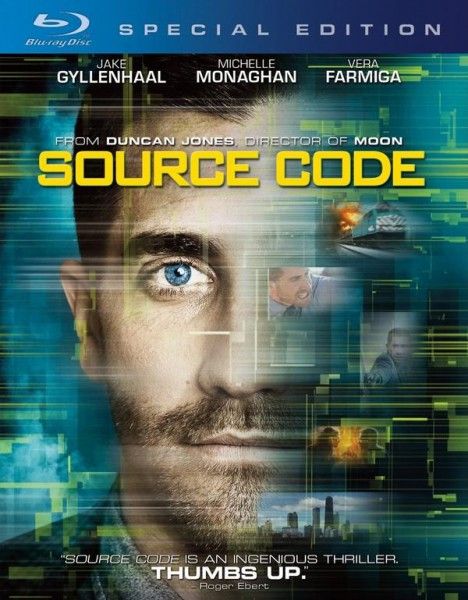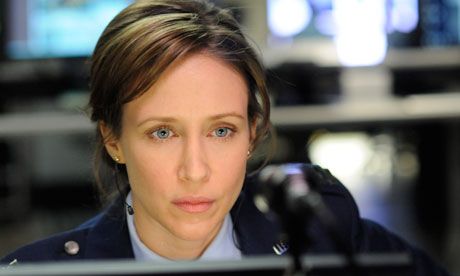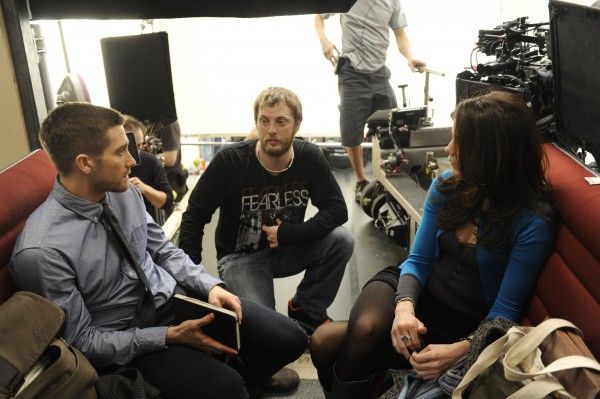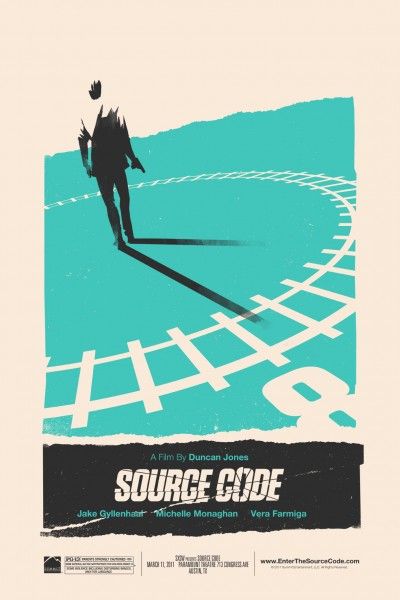Source Code is a fast-paced thriller in which the military can transport a soldier into the final 8 minutes of a dead man’s memory to gain access to a crime scene that has come and gone. This time-travelling plot device is more than vaguely familiar, as it is a culmination of concepts previously seen in Groundhog Day, Déjà vu, and the Quantum Leap TV series, but, when blended with a Twilight Zone-meets-Hitchcockian adventure vibe, this effort feels wholly original in a year swamped with sequels.
While not as intellectually compelling as director Duncan Jones’ Moon, it wasn’t designed to be. Where Moon was contemplative of its themes and sported a career-high turn from Sam Rockwell, this strong sophomore effort’s goal was to entertain and excite, and it fully succeeds on both counts. Duncan Jones proves he is still a talent to keep close tabs on. After living its first days on the screenplay blacklist, Source Code now finds itself readily available to the widest audience possible on home video. Hit the jump to read my review of the Source Code Blu-ray.
The last time Captain Colter Stevens (Jake Gyllenhaal) was conscious, he was piloting a helicopter across the skies of Afghanistan, so it is markedly odd when he is jolted awake in the passenger car of a train on its way to Chicago. Not to mention the woman named Christina Warren (Michelle Monaghan) sitting across from him, chatting him up like they’re good friends. He stumbles to the bathroom and finds a stranger in the mirror. 8 minutes later, with the passing of a freight train, his car explodes. Stevens wakes up startled, this time strapped into a dark metallic capsule with a mission operator, Colleen Goodwin (Vera Farmiga), quizzing him on what he was able to find. She debriefs Colter, informing him that he is living out the last 8 minutes of one of the terrorist’s victims named Sean Fentress, his closest physical match, and that his mission is to identify the bomber in that memory before he carries out his threat to level present day Chicago.
Denied any hint about his location or situation by the mustache-twisting scientist Dr. Rutledge (Jeffrey Wright), Colter is repeatedly forced back into those horrific 8 minutes as he investigates fellow passengers and searches for the bomb. With a story about a man imprisoned in a single, final thread of a foreign memory, racing to beat fate and his task’s deadline, the confines of a train cabin barreling towards a fiery demise on rails is an ideally dramatic, allegorical setting for it, however unsubtle it may be. Cool stuff.
The three lead performances from Jake Gyllenhaal, Michelle Monaghan and Vera Farmiga are all excellent in their own right. Gyllenhaal turns in a pitch-perfect turn as Captain Colter Stevens, letting the character have a few light moments by acknowledging the convolution of the premise, but switching back to a convincing state of stubborn determination and disorientation on a dime (factoid: attained in part by Jones cycling random bits of obscure music through an earpiece he gave Gyllenhaal with reckless abandon!). Michelle Monaghan’s Christina Warren is adorable and her incredulous responses to Colter’s loony behavior are understandable and often hilarious.
Despite how bored the writer seemed with making the budding attraction between the pair work-Colter’s initial proclamation of love is “You’re very decent”, oh how that would woo the ladies-Gyllenhaal and Monaghan are able to brew what little chemistry is needed here for an emotional investment. Vera Farmiga’s role takes place almost entirely in a swivel chair via webcam chat, but she too manages to soar above the limited nature of her character, playing Colleen Goodwin as a stern professional struggling with an internal, moral tug-of-war regarding her participation in the Source Code program.
For a concept that places restrictions on time, space or both as it is here, the direction and editing cannot falter. Jones and his editing team confidently create a palpable sense of escalating momentum and impending doom; a difficult task when, by the end of the film, we’ve seen the characters we’re supposed to progressively worry more about blown to smithereens and revived to perfect health half a dozen times. The inevitable unpleasantness in the train riders’ futures is never downplayed. Each ‘replay’ of the scenario is established in such a way that they always feel familiar without being monotonous, and it is made clear when a deviation from the previous trials occurs.
Last for the pro’s, Chris Bacon’s orchestral score is old school (I already mentioned Hitchcock) and injects a sense of foreboding and urgency at key moments. It holds steady with the pace of the train and immediately brings the audience up to beat from the first frame.
Performance-wise, Source Code is inconsistent to say the least. I touched on the good, now here’s the bad. The passengers, who are the only other entities for Colter to interact with other than Christina and the locomotive itself, are wooden, and not in an ‘underdeveloped to add to the mystery’ sort of way. Add to this the fact that Jeffrey Wright, of whom I’m typically a fan, is playing a Scooby-Doo villain here, no joke. I enjoy a tongue-in-cheek, self-aware performance as much as the next guy, but it only works when all parties involved get the same memo. In this, it is jarring and a little uncomfortable. Source Code is as much a tonal rollercoaster as it is a rollercoaster ride thanks to the uneven line delivery.
My other major gripe was the ending, which in many ways deflated the ramping intensity that I complimented Jones on achieving so masterfully. More frustrating is the fact that a seemingly perfect finale that would have solved this issue is ignored. A scene that is cinematically poignant and serves as a clever bookend to Colter’s efforts comes and goes when the titles should have rolled. Jones pushes through to give the audience an unearned and morally depraved* ending in a half-hearted attempt-or possible studio note-to leave the audience with that warm, gooey feeling we apparently so desperately require. What’s more, Jones uses the final five minutes to introduce a ‘twist’ of sorts that serves to further demystify and quash any questions regarding the Source Code program’s potential when it was our shared ignorance with Colter that drove the picture forward for the 90 minutes prior. An early attempt from Dr. Rutledge to throw out a heady rationalization on how the technology is plausible was painful enough, but the ending is the cherry on top.
Sci-fi is a genre that typically thrives on the audience’s acceptance that the hypothetical world in which the narrative exists is not our own. If the plot and setting are immersive and the characters developed, there should be no need to break down the mechanics of the world to characters that live and breathe in it every day. When you and a friend are microwaving a plate of nachos, how often does the conversation devolve into a deconstruction of the physics of the waves that cook it?
Even in fish-out-of-water tales, which Source Code is to an extent, the awe the audience feels should stem from the character’s OWN discovery of the rules that govern his new environment, not from having them listed off by a secondary character only to remain entirely unutilized until after the climax. Perhaps Jones’ tacked-on quantum mechanical subplot would have fit in a different film where the emphasis was on the broader application of the Source Code program, but as it stands here the focus should have always remained on this one man’s journey on the train. Ambiguous endings are sometimes the stronger ones (see: Inception).
While not a criticism of the film, I do think it should be noted that, as with any mystery, the replay value of Source Code may be limited depending on what you take from it. Obviously a whodunit becomes a hair less powerful when the ‘who?’ is answered for, so if the investigation grabs you more than the time travel aspect or the characters themselves, you may want to take that into consideration before a purchase.
The Source Code Blu-ray is presented in 1080p High Definition 1.78:1, and is a very impressive release. While skin tones look a bit unnatural on occasion, the black levels are nearly flawless-a relief given that much of the film takes place in a shadowy pod. There is a vivid range of color seen in the exterior establishing shots and fine details are fully distinguishable. An understated grain is also present to lend the picture a filmic feel without interfering with clarity.
On the audio front, as heard ratcheted up on my surround system, the sound design of this DTS-HD Master Audio 5.1 track was superb. I caught every piece of dialogue and it balanced appropriately with the ever present, ambient sounds of the train, whether it be the clanking on the rails, the rumble of the engine or the hushed discussions of neighboring riders. Equally critical are the intermittent explosions, which sound efficiently violent and are moments to be feared (in a good way) for the skittish. The packaging does not include a DVD backup or Digital Copy. Sorry.
The special features, also in 1080p high def, are slim. First up is “Access Source Code”, a tool that accompanies a play-through of the film and provides the viewer with a navigation widget for brief picture-in-picture EPK-like video presentations including cast interviews, behind-the-scenes footage, scientist interviews, etc. The interface was clunky, not helped by its tiny print. The videos lacked deep insight and without an option to view them individually, this was a wasted, one-time affair for me. You’ll also find an audio commentary with director Duncan Jones, star Jake Gyllenhaal and screenwriter Ben Ripley, and that’s all she wrote.
I leveled some heavy criticism in this review, but chalk it up to me being picky about my science fiction. This is a solid, entertaining genre entry that should appeal to the general masses as much as the geeks, and that’s a great thing to see. Does it surpass the one-two punch of Moon and District 9 we saw in ’09? No, but that was an exceptionally rare year for modern science fiction. As of July 2011, Source Code stands as one of the most enjoyable films of the year thus far.
Overall Rating: B+
*SPOILER WARNING: I’d like to take a moment to reiterate how ethically revolting I thought the ending twist of this flick was, comically so considering it was probably meant to milk applause out of the rowdier viewers who have yet to realize the filmmakers are not present at every screening. If my understanding of the ‘physics’ on display is sound, Colter hijacks the remainder of Sean Fentress’ existence in the parallel reality that he enters in his last trip into the program, and doesn’t seem to have any qualms about doing so. He then progresses to thieve Sean’s progress with Christina, who is now dating a stranger in another man’s skin. The bittersweet freeze-frame shot was passed up for this? This is one sick ‘feel-good’ ending, folks. I would have enjoyed it had Duncan Jones spun it as such, but again, this wasn’t ‘that’ movie. Was anyone else bothered by this?





